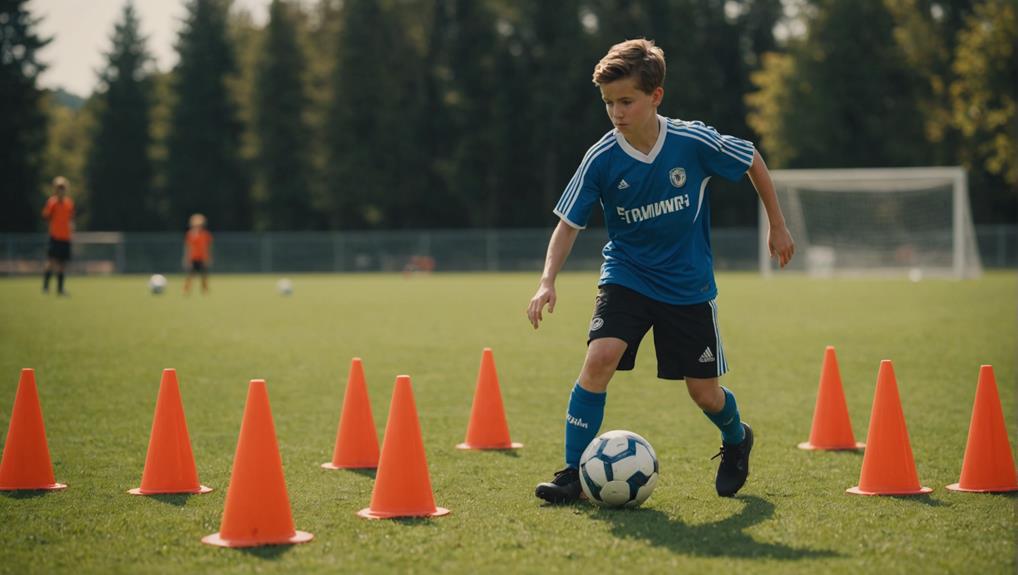
Steps to Becoming a Professional Soccer Player
July 8, 2024To become a pro soccer player, develop immense passion for the game and join top club teams for exposure. Dedicate daily hours to training and utilize club resources effectively. Showcase skills confidently in front of talent scouts and aim for advancements. Maintain fitness levels, focus on mental resilience, and strengthen physically. Regular workouts and proper nutrition are key. Research professional team opportunities, network within the industry, and learn the playing styles. Keep following these steps, and you'll be on the right path to achieving your dreams in the soccer world.
Develop Passion for Soccer
To become a professional soccer player, start by cultivating a genuine passion for the sport. A deep love for soccer will serve as the foundation for your journey towards a successful career.
Dedicate a significant amount of your free time to practicing soccer skills, honing your technique, and enhancing your overall performance on the field. Consistent training is key, so make sure to seek feedback from coaches to pinpoint areas where you can improve and grow as a player.
One essential step to keep in mind is joining the best club team in your area. Being part of a competitive team will expose you to higher levels of play, challenge you to elevate your game, and provide valuable opportunities for skill development.
Additionally, trying out for programs like the Olympic Development Program (ODP) can further showcase your talent to scouts and open doors to potential professional opportunities.
Learn the Sport Fundamentals
Cultivating a genuine passion for soccer will naturally lead you to the next step: learning the fundamental aspects of the sport. To excel in soccer, it's important to master key skills that form the foundation of your game.
Here are essential steps to help you grasp the sport's fundamentals:
- Understand the basic rules, positions, and tactics: Having a solid understanding of soccer's rules, player positions, and strategic tactics will provide you with a strong base to build upon.
- Practice ball control and dribbling: Enhancing your ball control and dribbling skills will allow you to maneuver through opponents effectively and maintain possession during the game.
- Work on passing accuracy: Developing precise passing abilities is crucial for connecting with teammates, creating scoring opportunities, and controlling the flow of the game.
- Improve shooting technique: Mastering shooting techniques will increase your chances of scoring goals and contributing significantly to your team's success.
Regular Training and Practice

Professional soccer players dedicate several hours each day to training and practicing to enhance their skills and maintain peak physical condition. Training sessions are vital for players to focus on specific aspects of the game such as ball control, passing accuracy, shooting techniques, and tactical awareness. These sessions also include drills, exercises, and conditioning programs to improve fitness components like endurance, speed, agility, and strength.
Additionally, regular practice with teammates is essential as it helps in building chemistry, improving teamwork, and understanding each other's playing styles. Consistent training and practice play a pivotal role in the life of a professional soccer player, allowing them to stay competitive, perform at their best during matches, and adapt effectively to various game situations.
Utilize Club Resources Effectively
Joining a quality soccer club team allows you to leverage valuable resources for improving your skills and advancing your career in the sport. Here's how you can make the most of club resources:
- Coaching: Club teams provide access to experienced coaches who offer structured training sessions, specialized drills, and tactical guidance tailored to enhance your skills on the field.
- Facilities and Competitive Opportunities: Utilize the facilities provided by the club for regular practice sessions and take part in competitive opportunities such as leagues and tournaments to test and hone your abilities.
- Scouts Exposure: Club environments can bring you exposure to scouts, college coaches, and potential pathways to professional soccer, increasing your chances of being noticed and scouted.
- Teamwork Development: Engaging with teammates and coaches in a club setting fosters teamwork, discipline, and healthy competition, all of which are vital aspects of developing as a professional player.
Prepare for Talent Scout Meetings

Showcase your soccer abilities and positive attitude confidently during talent scout meetings. Be prepared to discuss your training regimen, emphasizing the hard work and dedication you put into honing your skills. Talent scouts are interested in hearing about your game intelligence and tactical understanding, so make sure you can articulate how you read the game and make strategic decisions on the field.
When demonstrating your technical skills, focus on your ball control, passing accuracy, and shooting proficiency. A strong display of physical fitness will also leave a lasting impression on talent scouts. Passion for the sport should shine through in your conversations, showing your commitment to achieving your dream of becoming a professional soccer player.
Remember to highlight your accomplishments and achievements during scout meetings. Engage in meaningful discussions, ask insightful questions, and demonstrate your enthusiasm to improve. By actively participating in conversations and showing a genuine interest in the scout's feedback, you can leave a positive and lasting impression.
Set Clear Goals and Vision
Define your career objectives with specific, measurable goals in soccer and visualize your path to success.
Research the professional soccer landscape to understand the competition and set achievable milestones to track your progress.
Assess your skills honestly and align them with your vision of becoming a professional player.
Define Career Objectives
Crafting clear and ambitious career objectives is a fundamental step for any aspiring professional soccer player. To define your career objectives effectively in the domain of professional soccer, follow these key steps:
- Set Specific Career Goals: Clearly outline what you aim to achieve in your soccer career, whether it's playing for a specific team, reaching a certain level of competition, or mastering particular skills.
- Understand Competition Levels: Research the professional soccer landscape to identify the competition levels you need to navigate. Knowing the requirements and standards can help you set realistic objectives.
- Establish Milestones: Define significant milestones such as making it onto top club teams, securing spots in regional Olympic Development Program (ODP) squads, or achieving specific performance metrics.
- Conduct Self-Assessment: Regularly assess your skills and abilities to align your career objectives with your current capabilities. Recognizing strengths and areas for improvement will guide your goal-setting process effectively.
Visualize Success Path
To establish a clear path towards becoming a professional soccer player, begin by setting specific career goals and envisioning your success trajectory. Define measurable objectives, like making a specific team or reaching a certain skill level, to track your progress effectively.
Research the demands and competitiveness of professional soccer to align your ambitions with industry standards. It's important to set realistic timelines for each goal, taking into account factors such as training intensity and skill development.
Visualizing success by imagining yourself playing at the professional level can boost your motivation and commitment to achieving your objectives. By visualizing your success path, you create a roadmap that guides your actions and decisions, keeping you focused on your ultimate goal of becoming a proficient soccer player.
Gain High School and College Experience

Joining your high school soccer team and considering club or academy play during this time are essential steps towards gaining competitive experience and showcasing your skills to potential scouts.
Here are some key actions to take:
- High School Soccer: Embrace the opportunity to compete at a high level within your school team, where you can learn teamwork, game strategies, and improve your individual abilities.
- Club Team Participation: Enhance your skills further by joining a club team or academy to receive top-tier coaching, increased playing time, and exposure to a higher level of competition.
- Aim for an Athletic Scholarship: Aspire to earn an athletic scholarship for college soccer, which not only supports your education but also provides a platform for growth and visibility among college scouts.
- Engage in College Showcases: Attend college showcases, tournaments, and matches to catch the eye of professional coaches and scouts, who are always on the lookout for promising talent.
Focus on Physical and Mental Preparation
Focus on your physical preparation by maintaining high fitness levels through exercise and a healthy diet. Incorporate stretching and strength training into your routine.
Develop mental resilience by learning coping strategies to navigate the challenges and pressures of a professional soccer career.
Remember to prioritize injury prevention, rest, and a balanced lifestyle. This guarantees you stay healthy and perform at your best on the field.
Fitness Training Importance
Enhancing both physical and mental readiness is essential in professional soccer through dedicated fitness training. To excel in your journey to becoming a professional soccer player, consider the following key aspects of fitness training:
- Physical Fitness: Regular workouts focusing on endurance, speed, agility, and strength are important for improving on-field performance.
- Mental Preparation: Fitness training not only strengthens your body but also enhances your mental toughness, enabling you to stay focused and disciplined during high-pressure situations.
- Proper Nutrition: Fueling your body with the right nutrients is necessary for peak performance and ideal recovery.
- Injury Prevention: Incorporating injury prevention techniques into your fitness routine can help you stay on the field and avoid setbacks that may hinder your progress.
Mental Resilience Training
To excel as a professional soccer player, developing mental resilience through focused physical and mental preparation is vital. Mental resilience training is essential for handling the pressures, setbacks, and challenges that come with being an athlete. By cultivating a strong mindset, players can stay motivated, confident, and focused even during intense competition.
Visualization techniques, goal-setting, and maintaining a positive attitude are key aspects of mental preparation that can greatly enhance performance on the field.
Moreover, building mental toughness is necessary for overcoming obstacles, staying composed under stress, and bouncing back from defeats. Professional soccer players rely on mental resilience training to improve their concentration, decision-making skills, and overall mental strength in high-pressure situations.
Research Professional Team Opportunities

Begin by researching professional soccer teams in your area or desired location to gain a thorough understanding of their playing style and roster requirements. This step is vital in preparing yourself for potential tryouts and recruitment opportunities.
Here's how you can effectively research professional team opportunities:
- Explore Team Websites: Visit the official websites of professional soccer teams to gather information about their playing style, recent performances, and roster needs.
- Utilize Online Resources: Use online platforms and social media to stay updated on upcoming tryouts, scouting events, and open recruitment opportunities offered by professional teams.
- Attend Local Games: Watch professional teams play live in local games, tournaments, or showcases to analyze their strategies, player dynamics, and overall team performance.
- Network with Industry Professionals: Connect with current or former professional players, coaches, scouts, and attend soccer camps or training programs to expand your contacts and increase visibility within the soccer community.
Conclusion
In your journey to becoming a professional soccer player, remember that it takes dedication, hard work, and perseverance.
While it may seem challenging, with the right mindset and commitment, you can achieve your goals.
So, don't let doubts or setbacks hold you back. Keep pushing forward, stay focused on your dreams, and trust in your abilities to make them a reality.
You have what it takes to succeed in the world of professional soccer.


